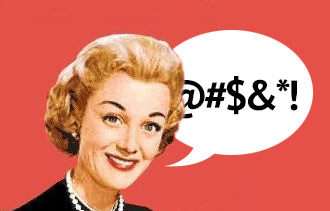 We do it a lot. Of course, we might call it different things. Profanity, swearing, cursing, cussing . . . yeah, we do it a lot.
We do it a lot. Of course, we might call it different things. Profanity, swearing, cursing, cussing . . . yeah, we do it a lot.
Of course, not everyone does it to the same degree, or with the same words. Sometimes that can be amusing, at least in certain contexts. A common Australian word for a cigarette, for example, is the same word as an insult for a homosexual in the US. In the UK, a very common swear word (though less severe these days than a few decades ago) simply means to have the quality of blood in the US and Canada. And that’s where everyone speaks the same language.
Swearing serves an important function, and the fact that we all do it to some degree or another means our characters probably should as well; but when should we do it, how much, and why?
Psychologists have been studying swearing for years, and it’s been scientifically documented that swearing serves an important outlet. The reasons for it are still debated, but tests show that swearing is related to instinctual behavior in response to aggression, pain, and grief. The theory I like is that it’s the same as an animal’s hissing, spitting, growling, etc., only we humans have grown so accustomed to language that we have to put some level of meaning behind it all.
Well, I’m an editor. I like language. I’m already biased toward that theory.
 Okay, so that’s what swearing helps with. It’s awesome that way. But what use is it in fiction?
Okay, so that’s what swearing helps with. It’s awesome that way. But what use is it in fiction?
While swearing serves an important function in real life, at least for the person doing the swearing, it doesn’t have the same effect on other people. It winds up being a great stress relief for the speaker, but over time there’s a diminishing return in terms of effectiveness, leading to people using it more and more to get the same effect. To the people around the speaker, though, all they get is the “more and more.”
The use of swearing in fiction has the same problem. There are really only two uses, and the audience only experiences the second use: shock value. Shock too much, and there’s no value to it. On the face of it, you might want to avoid swearing.
Well, no. Not entirely.
When I had introduced someone to both Firefly and the remake of Battlestar Galactica (gosh, nearly ten years ago now), he remarked on the fake swearing. “It’s amazing,” he said. “They’re swearing all the time, but it gets past the censors!”
Yes, and no. Yes, frak and goram gets past the censors, as did smeg on Red Dwarf. However, it also means that the audience experiences little to no diminishing returns. Since it’s an unfamiliar word, the shock value isn’t as high; but because it’s not considered coarse language in real life, the audience doesn’t associate it with the same sort of negative cultural issues that “real” swearing carries. You can use them far more often without losing the valuable aspects of swearing.
That doesn’t mean you have to only use fictional words, though. Remember, swearing in fiction is about shock value. It carries vital information, just like in real life. A real person swearing up a storm might be seen negatively, but you also know that they’re probably in a foul mood, almost certainly not thinking completely rationally, probably don’t want to be interrupted, and that whatever they’re experiences is probably the most important thing to them right now so don’t interrupt.
See why I like that earlier theory?

Captain Haddock certainly knew how to turn a phrase.
So, while I like the idea of using fictional swear words, I also don’t argue against the real ones. I simply caution authors to conserve their ammunition. Each real-world piece of profanity you fire off is going to reduce the effectiveness of the next one. If you want your audience to appreciate something attached to that word, you should ration its use.
On the other hand, fictional swear words can carry even more value than real-world ones, though not so much on the subject of shock value. Most of the people visiting this blog are interested in science fiction and fantasy, and both those genres tend to create alternate settings. As I noted at the beginning, swearing is different in different countries, even countries that share the same language. Swearing is inexorably tied to culture.
As an example, in Brandon Sanderson’s Stormlight Archive series, the most common piece of profanity is “storm it.” This is a world wracked by magical mega-hurricanes on a semi-regular basis. All of society, to say nothing of the native flora and fauna, have adapted to these events. To refer to someone as a storming idiot seems a bit odd to our ears, but it carries a wealth of meaning about the world the audience is entering.
For science fiction, you might easily have linguistic drift, changing common swear words into something slightly different by switching out a vowel or a couple of consonants. Your audience can pick up the meaning based on context, even if it’s an unfamiliar word; and it can show how language changes over time without messing with words that are needed to convey an exact, rather than implied, meaning.
Sometimes, though, you can get away with not having a single swear word at all. I’ve read many books where the author mentions that a character is swearing, but never mentions the actual swear words. Sometimes that works, sometimes it doesn’t. It depends on the characters, the story, and the audience. David Eddings got away with it (mostly) in his Garion series, for example.
The one thing you can be certain of, whether it’s shown or not, whether the words are familiar to the audience or not, is that someone will be swearing. It’s too common a practice to assume no one does it, even if you yourself don’t indulge in the coarser words. Keep it in mind when creating characters, as how much they swear, in which contexts, and with what words, is a way to clearly differentiate personalities with very little description. Even if the swear words are made-up, the audience will notice context, because everyone is familiar with swearing. Most people can tell when someone is swearing in an unfamiliar language, because the tone is pretty much universal.

I was ready to argue with you a bit, until I got to this bit.
You see, in my current work in progress, I have a character who cusses all the time. The character is a career criminal who is now out for blood in a post apocalyptic setting. It’s not about shock value, but part of the character’s background and his own use of language. Along the lines of what you say, he’s numb to it, he’s done it so much. The thing is, he’s the bad guy.
The hero cusses too, but not as much. 🙂
LikeLike
It’s still about shock value, but remember that I was talking about the audience’s reaction. Use it too much, and the audience is just as numb to it as your character.
In writing, it’s ultimately about using words and phrases so often that they either become invisible (and therefore pointless) or distracting (and therefore pointless). Like I was saying last week about adverbs, using them too much means less information for the audience. In the unnamed example I alluded to, the author kept referring to nearly every character action as happening “inwardly.” Or, sometimes they would be redundant, like “he swore angrily.” (Yes, that’s from this book, it’s open in front of me, it’s pure coincidence that it happens at this time.) I suppose it gives me vital information, in that I know he’s not swearing flirtatiously or happily . . . but was that misunderstanding really a danger? Eventually, the redundant or strange adverbs distracted me from the story. They lost meaning.
So when I refer to the characters showing personality through their words, I’m not necessarily saying you should have one character using swear words all the time just to show he’s swearing. That might work, it might not. It’s an art, not a science; it depends on the character, the story, your skill as a writer, the audience’s expectations . . . a lot of factors go into this.
That’s why I argue to ration things. There’s an equilibrium to reach between using it so much that it loses value, and using it so little that a single swear word seems jarringly out of character. That’s why fictional swear words and grawlixes wind up being useful even with an audience that’s used to real-world profanity.
LikeLike
Swearing creatively is always an effort. Profanity in fiction that is culture specific does help greatly with the world-building otherness. Profanity must match the character and be situation appropriate. Context and connotation is everything. I’m reading a book the author provided free for a review where the Roman soldier uses the term “humping the whores” but a few pages later, the senator’s daughter drops the f-bomb and c**k in the same sentence. Jarring.
Writing fiction is like cooking. The recipe must be just right for the meal to be palatable. The spiciness of profanity must be well-balanced so as not the overpower the palate of the reader.
LikeLike
If you look up some of the more low-brow Roman writings, including graffiti, you’ll find that they really did use those words (or at least words we can translate directly as such). Someone showed me some particularly vulgar Latin poetry one time, and it was beyond normal R-rated movie content. It was quite amusing.
LikeLiked by 1 person
I don’t object to the use of the words per se. it just seems inconsistent for the soldier *not* to use the f-word and the patrician daughter to drop it in casual conversation with her sister.
LikeLike
I do not mind swearing in my fiction as long as it sounds as if it’s something natural for the character to say. Everything the character days should arise from who they are. I don’t like swearing for sick value in my writing because it makes what I’m writing sounds farcical. Great post!!! You really made me think
LikeLike
Hmmmm, in the short story I am currently working on one of the characters is a rapist, and he swears fairly often.
The swearing has a specific purpose, though; he often says “Jesus f—ing Christ!”, which is important because the story is ultimately a redemption story. It is an ironic prayer.
LikeLike
Aff told me that the office he worked at had a pet cockatoo (amongst a few others) in the IT department. The language it picked up… XD
Contextual swearing is also fun. There’s the ‘if we insult you, you’re part of the group’ and the angrier ‘insults we throw at the ones we don’t like.’ LOTS harder to get across in text.
LikeLike
By Klono and Noshkabeming this was a fine post!
LikeLike